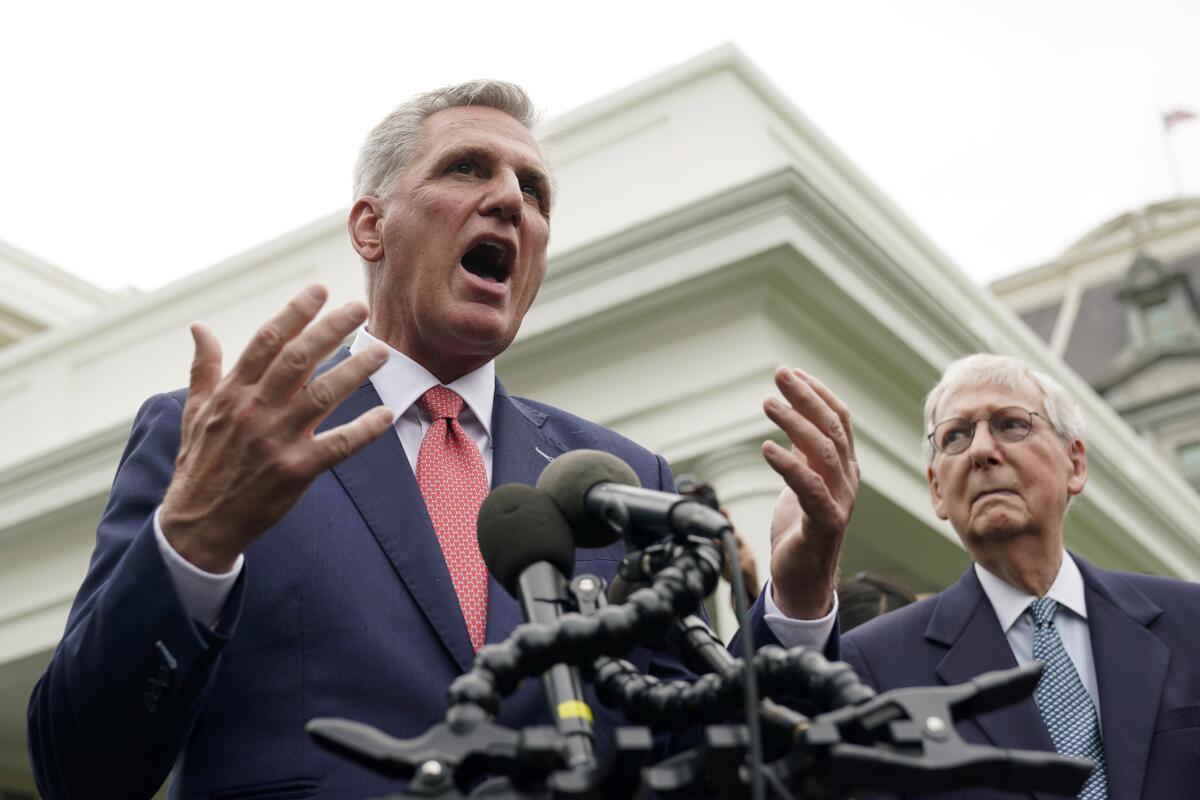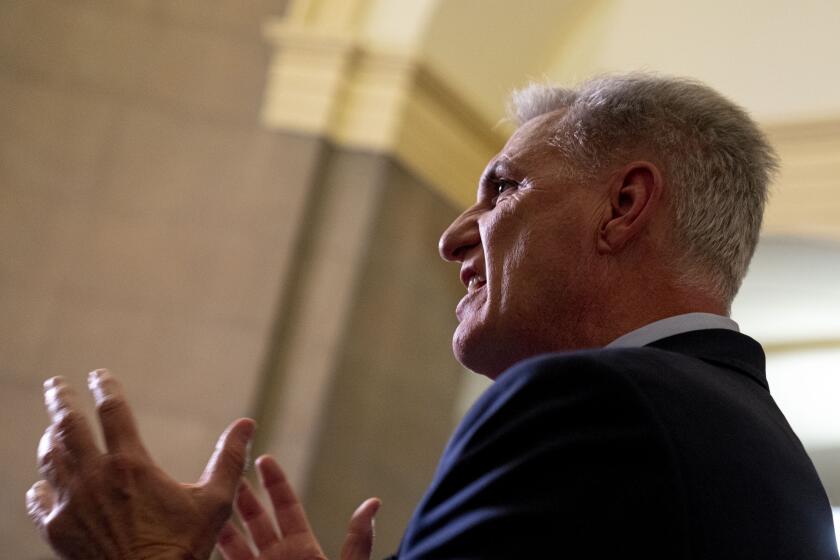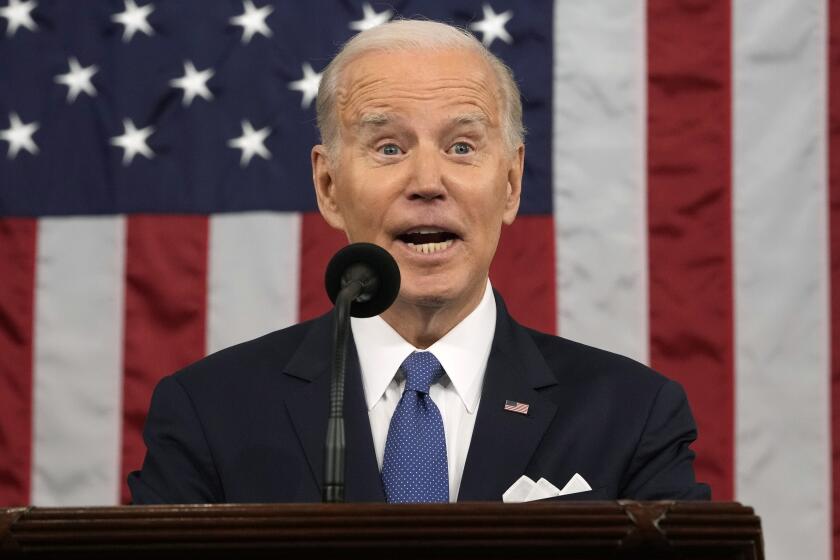Column: Why is the climate on the table in the debt ceiling fight?

Lost amid all the attention to the partisan standoff over raising the nation’s debt limit is the insanity of a big part of the Republicans’ bargaining position: Many of the savings they demand in return for a higher debt ceiling would come from killing the landmark clean energy initiatives President Biden achieved just nine months ago, and which already have set off a “gold rush” of job-creating investments.
The inattention to this issue since House Republicans narrowly passed their debt limit bill last month suggests just how inured we’ve become to the Republican Party’s denial of climate change.
That’s bad enough. But in this instance, the party is going beyond denialism to actually trying to thwart actions to mitigate global warming in the United States. What’s more, besides wiping out Biden’s clean energy tax incentives for companies and individuals, the Republicans want to sweeten tax breaks for fossil fuel production.
Opinion Columnist
Jackie Calmes
Jackie Calmes brings a critical eye to the national political scene. She has decades of experience covering the White House and Congress.
Future generations will be astonished at Republicans’ head-in-the-sand position — assuming the world remains habitable for future generations.
Even as negotiators for the White House and House Speaker Kevin McCarthy continued talking Wednesday to reach a debt deal, the World Meteorological Organization announced that the Earth would likely breach a critical warming threshold, at least temporarily, within the next five years, which would be the hottest period in recorded history. The threshold — an increase of 1.5 degrees Celsius above preindustrial temperatures — is the tipping point for triggering polar ice melts, inundated coastlines, ecosystem destruction, food shortages, infectious diseases and deadly weather extremes far beyond what is already happening.
And just a month before McCarthy introduced the Republicans’ retrograde bill, the United Nations’ Intergovernmental Panel on Climate Change warned that our warming world was facing a “critical moment in history.”
You wouldn’t know it by the “drill, baby, drill” stance of one of our two major political parties.
The handcuffs that House Republicans have put on Speaker McCarthy will make it almost impossible for him to sign off on a debt ceiling compromise.
The hundreds of billions of dollars’ worth of clean energy tax incentives and loans that Biden signed into law as part of last year’s Inflation Reduction Act easily amount to the nation’s biggest investment yet against climate change, and one of the largest stimulants of industrial policy since the New Deal.
The popularity of the tax credits for things like electric vehicle purchases, wind and solar projects, sustainable aviation fuel development, battery manufacturing and carbon capture already has spurred so much demand and investment that government and private-sector analysts have had to increase projections of the measures’ costs. Yet a Brookings Institution analysis found that the Treasury’s higher costs would be offset by the value of the societal benefits from reduced emissions.
And without those carrots for industries and consumers, the United States won’t be able to keep its international commitment to reduce greenhouse gas emissions by 2030 to a level that’s at least half what they were in 2005. Even with the incentives, the nation will fall short. More remedial actions are needed, not fewer.
Some legal scholars say a clause in the 14th Amendment could mean the president can bypass Congress and clear the way for more debt to be issued. Others are dubious.
The good news is that Republicans will almost certainly have to retreat on repealing the Biden clean energy package, at least for now. Both sides have to compromise to increase the nation’s debt ceiling — so that the Treasury can keep borrowing to pay bills incurred by past presidents and Congresses — or else they’ll share the blame for an economy-shaking default as early as June. As worried as some Democrats are about what Biden might agree to, he’s not going to forfeit his climate agenda. It’s one of his signature achievements and an especially popular one among younger voters that Democrats covet.
Congressional Republicans, heedless of the planet as well as young voters, are sure to continue to try to chip away at the president’s climate change mitigation programs. Led by Donald Trump, the aspirants for Republicans’ 2024 presidential nomination already are championing energy platforms limited to fossil fuel development, period.
The party’s promotion of oil, gas and coal, and its hostility to addressing climate change, is so ideologically ingrained that Republicans oppose the Biden incentives as “corporate welfare” even though most of the new plants, projects and jobs the tax credits are spawning are in red states and congressional districts. In April, McCarthy crowed that the House debt limit bill, by repealing clean energy credits, would “end the green giveaways for companies that distort the market and waste taxpayers’ money.” Ever the hypocrite, he proposed to expand the corporate welfare that oil and gas producers have enjoyed for decades.
Attention should be paid: The debt limit showdown heating up this week isn’t just a thorny budgetary issue for the green-eyeshade crowd. The future of sustainable energy in the U.S. is at stake, and with it, the future of the planet as well.
More to Read
A cure for the common opinion
Get thought-provoking perspectives with our weekly newsletter.
You may occasionally receive promotional content from the Los Angeles Times.














